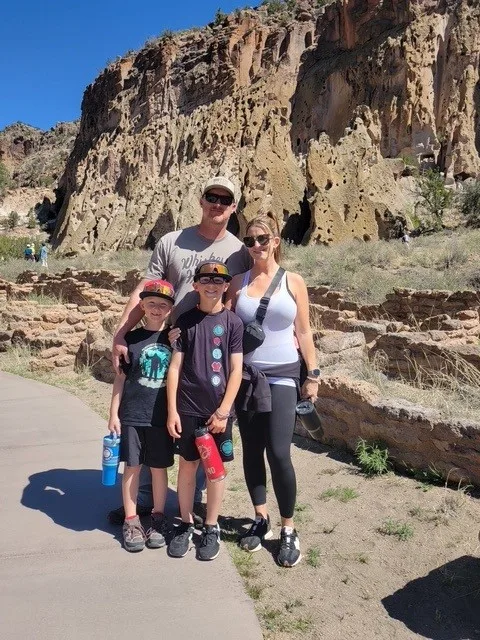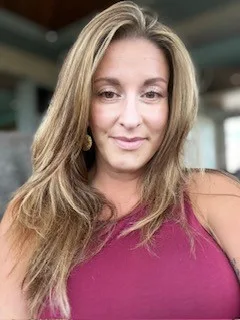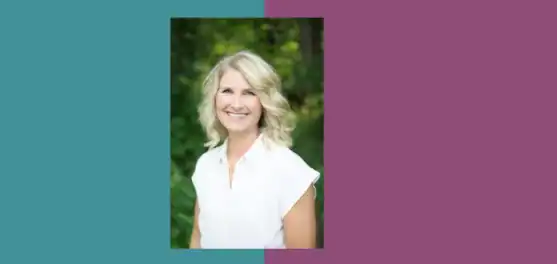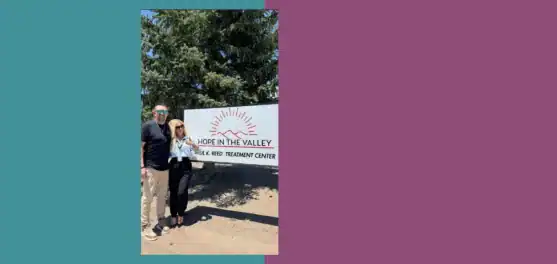“For years, I lived under the weight of shame,” Shayna says. “I believed that if I wanted to recover, I had to suffer first. But now I know better. You don’t have to suffer to heal. Recovery doesn’t have to cost your life.”
In the wide open beauty of New Mexico—the Land of Enchantment—Shayna Klassen lives a life she once thought she didn’t deserve. A loving husband. Two miracle children. A career dedicated to saving lives. But the path here wasn’t gentle, and it wasn’t fair.

She is in long-term recovery from opioid addiction and is someone with lived experience of suicidal ideation, attempts, and profound loss. For much of her early recovery, she grieved silently for friends and loved ones who died from addiction or by suicide—many of them carrying the same weight of trauma that she did.
At 16, Shayna was sent away to what she now identifies as a “troubled teen institution”—a wilderness camp followed by a residential facility. Together, they added up to two and a half years of institutional trauma: physical abuse, psychological manipulation, and sexual violence that left deep scars. “I thought it was the price I had to pay if I wanted to live,” she says.
Building a Better System—From the Inside Out
When Shayna got sober, she didn’t just reclaim her life. She vowed to use her pain to change the system that failed her.
She returned to the world of youth treatment—but this time as a professional. After working at two residential treatment centers, she became part of the leadership team at a 120-bed youth facility. When she arrived, the facility was averaging 40 to 50 physical restraints per day.
Under Shayna’s guidance and the implementation of trauma-informed, evidence-based care, that number dropped to nearly zero.
“I earned every certification I could get my hands on,” she says. “I became immersed in crisis de-escalation. But more importantly, I became obsessed with proving that we can help people without hurting them.”
The experience taught her a lesson she now carries into every room she enters: healing doesn’t require harm. Trauma is not the cost of treatment.
Speaking Out, So Others Don’t Stay Silent
Over time, Shayna’s path took her beyond treatment centers and into the heart of national suicide prevention. She joined the Suicide Prevention Resource Center (SPRC) and later serving on the Lived Experience Advisory Committee (LEAC). She brought her voice—and her story—to spaces that often lacked both.
Today, as National Training Director at the QPR Institute, Shayna trains thousands through “Question, Persuade, Refer” suicide prevention programs. She is especially committed to tackling the intersection of substance use and suicide, a link still ignored by many in the field.
“People with substance use disorders are six to ten times more likely to die by suicide,” she explains. “Over half also live with mental health conditions like depression or anxiety. If we don’t talk about this overlap, we’re leaving people behind.”
Some organizations remain hesitant to address the issue. They fear stigma, liability, or public discomfort. But not QPR. “We confront the full scope of risk,” Shayna says. “Because if we don’t, we risk lives.”
A Mission Fueled by Hope
Shayna’s work now touches leaders across sectors—especially in workplaces, where stress, isolation, and stigma too often go unchecked. She wants employers to understand: compassionate, evidence-informed practices save lives. They also build resilient, loyal workforces.
Her personal “superpowers” help drive this message home:
- She’s comfortable in discomfort, willing to talk openly about suicide, addiction, and pain.
- She sees connections others miss—integrating mental health, trauma, and social pressures into one clear picture.
And she never forgets her mission: reduce suffering, build connection, and prevent loss.

What gives her hope, even after all she’s seen? “Small moments,” she says. “When someone feels heard. When someone reaches out instead of pulling away. When I meet someone who says, ‘Your story helped me keep going.’”
But it’s also the quiet joy of her own life. A home in the desert. A family she loves. A belief, once foreign, that she is worth it.
“For years, I lived under the weight of shame,” Shayna says. “I believed that if I wanted to recover, I had to suffer first. But now I know better. You don’t have to suffer to heal. Recovery doesn’t have to cost your life.”
She’s living proof.
Learn more about Shayna’s work and QPR Institute at https://qprinstitute.com. If you or someone you know is struggling, you are not alone. Help is available.
Share Your Story
This epidemic has given us one common experience: we all have a story to share. At SAFE. Project, we believe that we strengthen one another by sharing our experience. Whether you are in recovery, lost a loved one, or are making a difference in your community, you can help others on this journey. We’d like to hear from you.


